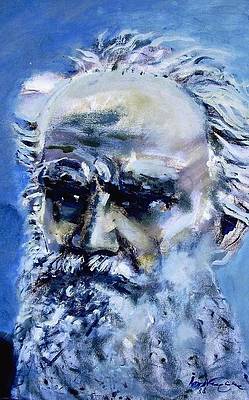Leo Tolstoy Archive
Written: 1888
Source: "Sevastopol," by Leo Tolstoy, translated by Isabel F. Hapgood, Published by Thomas Y. Crowell Co., 13 Astor Place
Transcription/Markup: Andy Carloff
Online Source: RevoltLib.com; 2021

On this side of the bay, between Inkerman and the northern fortifications, on the telegraph hill, about midday, stood two naval men; one was an officer, who was engaged in observing Sevastopol through a telescope, and the other had just arrived at the signal-station with his orderly.
The sun stood high and brilliant above the bay, and played with the ships which floated upon it, and with the moving sails and boats, with a warm and cheerful glow. The light breeze hardly moved the leaves of the dry oak-shrubs which stood about the signal-pole, puffed out the sails of the boats, and ruffled the waves.
Sevastopol, with her unfinished church, her columns, her line of shore, her boulevard showing green against the hill, and her elegant library building, with her tiny azure inlets, filled with masts, with the picturesque arches of her aqueducts, and the clouds of blue smoke, lighted up now and then by red flashes of flame from the firing; the same beautiful, proud, festive Sevastopol, hemmed in on one side by yellow, smoke-crowned hills, on the other by the bright blue sea, which glittered in the sun, was visible the same as ever, on the other side of the bay.
Over the horizon-line of the sea, along which floated a long wreath of black smoke from some steamer, crept long white clouds, portending a gale. Along the entire line of the fortifications, especially over the hills on the left, rose columns of thick, dense, white smoke; suddenly, abruptly, and incessantly illuminated by flashes, lightnings, which shone even amid the light of high noon, and which constantly increased in volume, assuming diverse forms, as they swept upwards, and tinged the heavens. These puffs of smoke flashing now here, now there, took their birth on the hills, in the batteries of the enemy, in the city, and high against the sky. The sound of the discharges never ceased, but shook the air with their mingled roar.
At twelve o'clock, the puffs of smoke began to occur less and less frequently, and the atmosphere quivered less with the roar.
“But the second bastion is no longer replying at all,” said the officer of hussars, who sat there on horseback; “it is utterly destroyed! Horrible!”
“Yes, and the Malakoff only sends one shot to their three,” replied the officer who was looking through his glass. “It enrages me to have them silent. They are firing straight on the Kornilovsky battery, and it is not answering at all.”
“But you see that they always cease the bombardment at twelve o'clock, just as I said. It is the same to-day. Let us go and get some breakfast ... they are already waiting for us ... there's nothing to see.”
“Stop, don't interfere,” said the officer with the glass, gazing at Sevastopol with peculiar eagerness.
“What's going on there? What is it?”
“There is a movement in the trenches, and heavy columns are marching.”
“Yes, that is evident,” said the other. “The columns are under way. We must give the signal.”
“See, see! They have emerged from the trenches.”
In truth, it was visible to the naked eye that dark masses were moving down the hill, across the narrow valley, from the French batteries to the bastions. In front of these specks, dark streaks were visible, which were already close to our lines. White puffs of smoke of discharges burst out at various points on the bastions, as though the firing were running along the line.
The breeze bore to them the sounds of musketry-shots, exchanged briskly, like rain upon the window-pane. The black streaks moved on, nearer and nearer, into the very smoke. The sounds of firing grew louder and louder, and mingled in a lengthened, resounding roar.
The smoke, rising more and more frequently, spread rapidly along the line, flowed together in one lilac-hued cloud, which dispersed and joined again, and through which, here and there, flitted flames and black points—and all sounds were commingled in one reverberating crash.
“An assault,” said the officer, with a pale face, as he handed the glass to the naval officer.
Orderlies galloped along the road, officers on horseback, the commander-in-chief in a calash, and his suite passed by. Profound emotion and expectation were visible on all countenances.
“It cannot be that they have taken it!” said the mounted officer.
“By Heavens, there's the standard! Look, look!” said the other, sighing and abandoning the glass. “The French standard on the Malakoff!”
“It cannot be!”